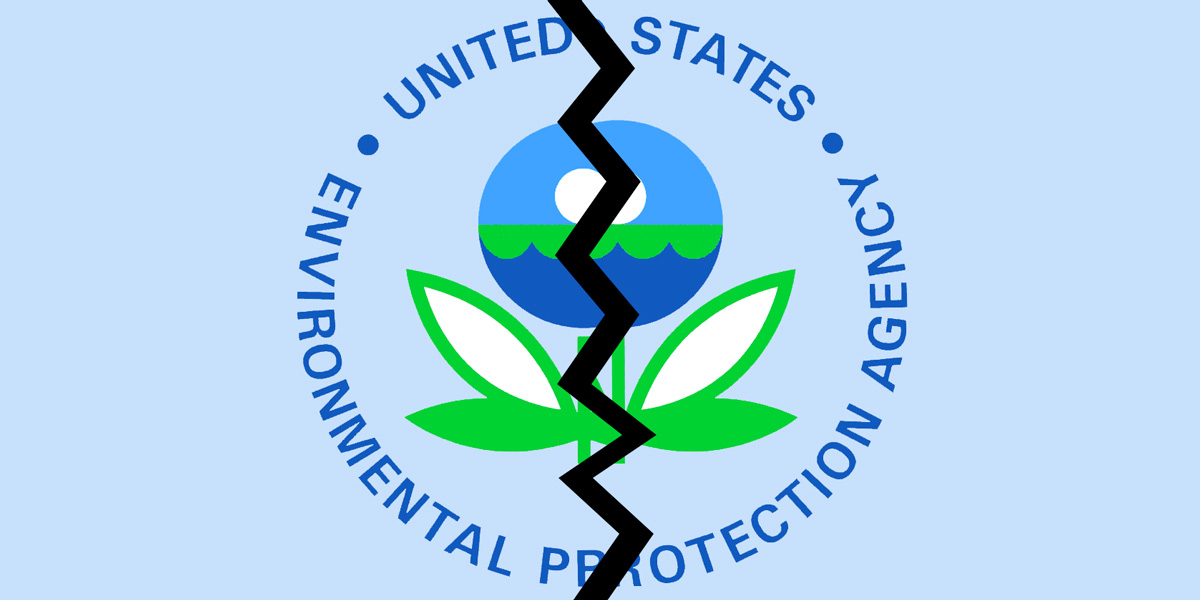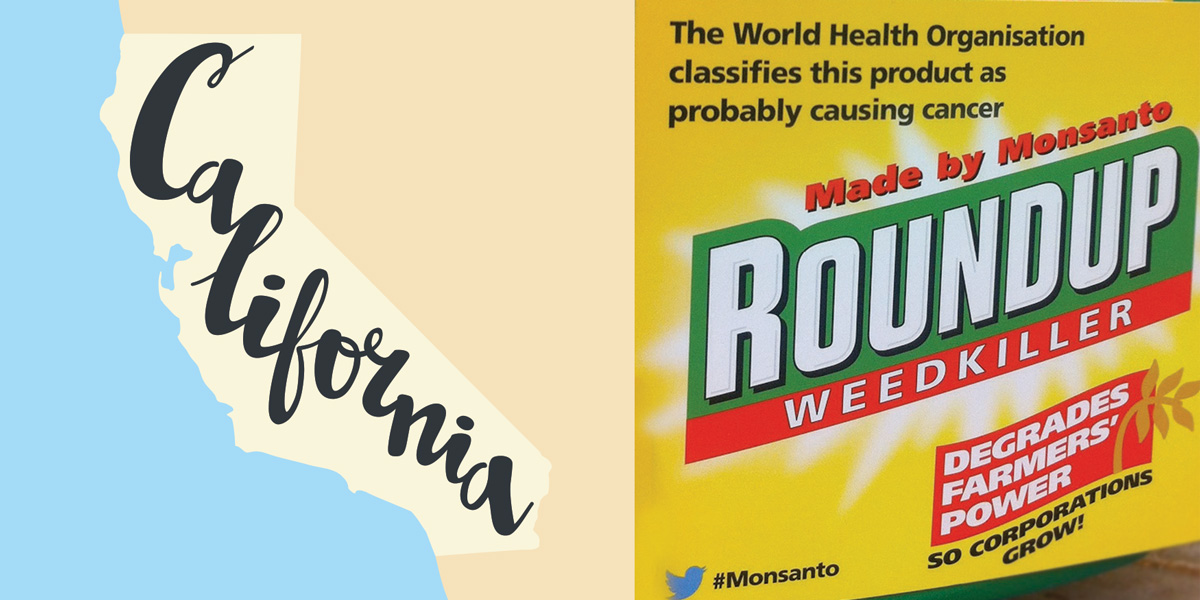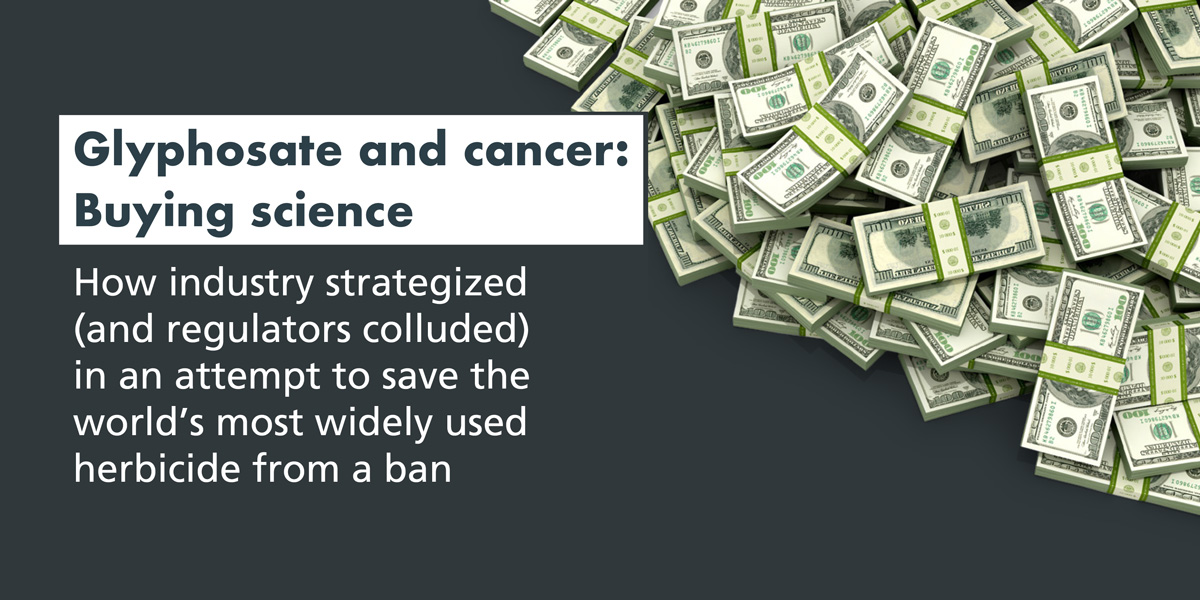EU member states still reject GMO cultivation

The majority of European governments have re-affirmed their opposition to the cultivation of GM crops. Governments voted against a proposal to authorise two new strains of GM maize, the first new GM crops since 1998. But the final decision now rests with the European Commission. The Commission also needs to decide on the fate of the only GM crop grown in Europe, Monsanto’s MON810, which produces toxins that kill maize pests.
Glyphosate: Discord at the US Environmental Protection Agency
The carcinogenic nature of glyphosate, the most widely used pesticide in the world, has opened up a deep division among US federal experts. A confidential document from the US Environmental Protection Agency (EPA) shows that the EPA's Office of Research and Development (ORD) clearly disagrees with the preliminary opinion of another EPA department, the Office of Pesticide Programs (OPP).
Glyphosate not classified as a carcinogen by ECHA
The European Chemicals Agency (ECHA) has concluded that the available scientific evidence did not meet the criteria to classify glyphosate as a carcinogen, as a mutagen or as toxic for reproduction. But twenty health and environmental organisations expressed concerns regarding conflicts of interest and transparency at the agency. Greenpeace accused ECHA of sweeping scientific evidence “under the carpet” and the Health and Environment Alliance (HEAL) said the agency’s verdict was “greeted with grave concern and disappointment in the health and environment community”.
California EPA becomes first US agency to declare that Roundup causes cancer
The state of California has finalized its decision designating glyphosate, the main ingredient in the pesticide Roundup, as a known human carcinogen under the state’s Proposition 65.
Unsealed documents raise questions on Monsanto’s weedkiller
The reputation of Roundup took a hit when a federal court unsealed documents raising questions about its safety and the research practices of its manufacturer, Monsanto. The records suggested that Monsanto had ghostwritten research that was later attributed to academics and indicated that a senior official at the US EPA had worked to quash a review of Roundup’s main ingredient, glyphosate, that was to have been conducted by the US Department of Health and Human Services.
MEPs urge Juncker not to renew glyphosate licence
Thirty MEPs have questioned the trustworthiness of one of the studies used by EFSA for its assessment that concluded glyphosate does not cause cancer. The MEPs asked the EU Commission’s President Juncker not to propose any new approval of glyphosate in the EU until the European Chemicals Agency (ECHA) and the European Food Safety Authority (EFSA) have checked the validity of some of the studies used in their assessments of glyphosate.
Why researchers are concerned glyphosate may cause cancer
A group of environmental health researchers has published a peer-reviewed article calling for US federal regulators to reassess the safety of glyphosate. The article concludes, “current safety standards for GBHs [glyphosate-based herbicides] are outdated and may fail to protect public health and the environment”.
High glyphosate levels in mothers leads to shorter pregnancies and smaller babies
Children’s Environmental Health Network (CEHN) has announced new evidence highlighting growing concern over sharply rising herbicide use and risks to pregnant women and children living in the rural Midwest of the USA. One ongoing study of pregnant women in an Indiana obstetric practice has found glyphosate in the urine of over 90% of test subjects. Mothers with relatively higher levels of glyphosate were more likely to have shorter pregnancies and deliver babies with lower birth weight.
Glyphosate Residue Free certification launched for US food products
Glyphosate Residue Free certification for US food products has been launched by The Detox Project, in a move that gives consumers a way of avoiding the “probably carcinogenic” chemical. The development comes as the US Dept of Agriculture has quietly dropped plans to start testing food for residues of glyphosate.
Roundup: Monsanto’s Superfund secret
Documents obtained as a result of a Freedom of Information Act request show that there are disturbing environmental and human health concerns at the beginning, not just at the end, of Roundup’s lifecycle. Glyphosate, the active ingredient of Roundup, is made from phosphate that’s mined in Idaho. When phosphate ore is refined into elemental phosphorous, it leaves a radioactive by-product known as slag. For years, this slag was actually sold to the town of Soda Springs and nearby Pocatello, and people built their homes and roads out it. In the 1980s, however, the EPA conducted a radiological survey of the community and warned that citizens might be at risk from elevated gamma ray exposure.
Farm consultant concerned over GMOs, use of glyphosate
Are today's feed production methods involving GMOs and glyphosate resulting in a loss of nutrient density and breakdown of vitamin availability that's detrimental to dairy cows? Agricultural nutrition consultant and former Monsanto employee Dieter Harle thinks these factors may explain the many instances of apparently healthy cows suddenly declining and dying on farms.
Cargill strengthens its non-GMO supply chain; Monsanto whips up hostility to the move
In what Monsanto and its supporters clearly see as a worrying development, the GMO-supporting agribusiness giant Cargill has responded to the ever-growing demand for non-GMO products by announcing a new identity preservation programme for non-GMO crops and some new Non-GMO Project verified ingredients. Monsanto and its allies have been whipping up hostility to the move on social media.
The 750 studies that GMO regulatory bodies often ignore
The Brazilian Ministry of Agrarian Development (MDA) has published a new online book in English: “Transgenic crops hazards and uncertainties: More than 750 studies disregarded by the GMOs regulatory bodies”. It examines research showing hazards to human and animal health, as well as risks to the environment, and agronomic or socioeconomic problems.
Monsanto’s new GM tech to defeat corn rootworm “will work only briefly”
The most costly beetle in the US, the corn rootworm, keeps evolving ways to resist pesticides designed to protect a $50-billion corn industry, reports an important article in Scientific American. The latest attempt, from Monsanto, involves a genetic engineering technique that embeds gene-silencing (RNA interference or RNAi for short) molecules in corn that target specific rootworm genes, killing the insect. But scientists warn that it will work only "briefly". And Europe doesn't have a problem with the rootworm, finding that the best defence is in crop diversity and rotation.
“New Breeding Techniques” and synthetic biology – genetic engineering by another name
Advocates claim that synthetic biology and the so-called New Breeding Techniques (NBTs) are distinct from genetic engineering (GE). But in fact synthetic biology and NBTs carry similar risks to old-style GE, and even create novel hazards.
Indian govt asked to cut the price of GM Bt cotton seeds due to poor yield
In a letter to the Indian government’s agriculture minister, Radha Mohan Singh, the Swadeshi Jagran Manch (SJM, the economic wing of Sangh Parivar, the Hindu nationalist movement in India) urged him to provide relief to farmers suffering from low cotton crop yields, by reducing the trait value of Bt cotton seeds. According to SJM, efficacy of the Bt trait has come down vastly in the last two years, so its trait value should also be reduced.
UN experts denounce “myth” that pesticides are necessary to feed the world
The idea that pesticides are essential to feed a fast-growing global population is a myth, according to UN experts. A new report, being presented to the UN human rights council on Wednesday, is severely critical of the global corporations that manufacture pesticides, accusing them of the “systematic denial of harms”, “aggressive, unethical marketing tactics” and heavy lobbying of governments which has “obstructed reforms and paralysed global pesticide restrictions”. The report says pesticides have “catastrophic impacts on the environment, human health and society as a whole”, including an estimated 200,000 deaths a year from acute poisoning. Its authors said: “It is time to create a global process to transition toward safer and healthier food and agricultural production.”
Organic wheat dodges mycotoxin
Saskatchewan organic wheat producers have “defied conventional wisdom” by escaping the fusarium fungal disease, while thousands of conventional farms were affected. Could glyphosate be to blame for the scourge on the conventional farms?
Gates-funded programme plans to release gene drive to eradicate mosquitoes in Burkina Faso
A programme funded by the Gates Foundation wants to release a “gene drive” in Burkina Faso to eradicate mosquitoes, with the claimed aim of combating malaria.
Europe clears Dow-DuPont merger
The European Commission (EC), the governing body of the European Union, has given the green light for the $130 billion merger of Dow Chemical and DuPont to proceed.
ChemChina wins US approval for $43 billion Syngenta deal
China National Chemical Corp. has won US antitrust approval for its $43 billion takeover of Swiss pesticide maker Syngenta, bringing China’s largest foreign acquisition one step closer to the finish line.
BASF gets license to use CRISPR
BASF has announced that it has reached a global licensing agreement with the Broad Institute of MIT and Harvard for the use of CRISPR-Cas9 genome-editing technology for use in agricultural and industrial microbiology applications.
France tables EU-wide non-agricultural pesticide ban
The senator behind France’s ban on pesticides for domestic use has submitted a draft European resolution calling on the EU to implement a full ban on the non-agricultural use of pesticides.
UK: Tory voters want environmental regulations maintained post-Brexit
A significant majority of Conservative voters want EU environmental regulations to be maintained or even strengthened in the wake of Brexit, a poll carried out for the Tory thinktank Bright Blue has found. The poll also found that 2/3 support a ban on the production of GMO crops.
PLEASE SUPPORT GMWATCH
If you like what we at GMWatch do and want to see us continue, please make a donation. We appreciate your support.
LOBBYWATCH
New report shows glyphosate producers are “buying science”
Monsanto and other glyphosate manufacturers appear to have distorted scientific evidence on the public health impacts of glyphosate in order to keep the controversial substance on the market, according to a new report released by GLOBAL 2000 (Friends of the Earth Austria). The report is co-authored by GMWatch editor Claire Robinson.
Inside the academic journal that corporations love
A new exposé focuses on the industry-linked journal Regulatory Toxicology and Pharmacology, which in 2000 published a Monsanto-supported review concluding that glyphosate was safe for human health.
Conflicts of interest among National Academies’ GMO committee members
The National Academies of Sciences, Engineering and Medicine (NASEM) has released a new report on “the future products of biotechnology”. The report discloses no conflicts of interest among the members of the committee that produced it, even though NASEM has already acknowledged that two committee members (authors) on the report and the study director had conflicts of interest. A total of six conflicts of interest were identified in a New York Times article.
Private companies are funding public-university research
A new investigation looks at the role played by corporate funding in public universities across the United States. The article details the increasing ease with which corporate representatives have access to researchers, although some are more comfortable with the arrangement than others. Monsanto collaborates with universities in various ways.














